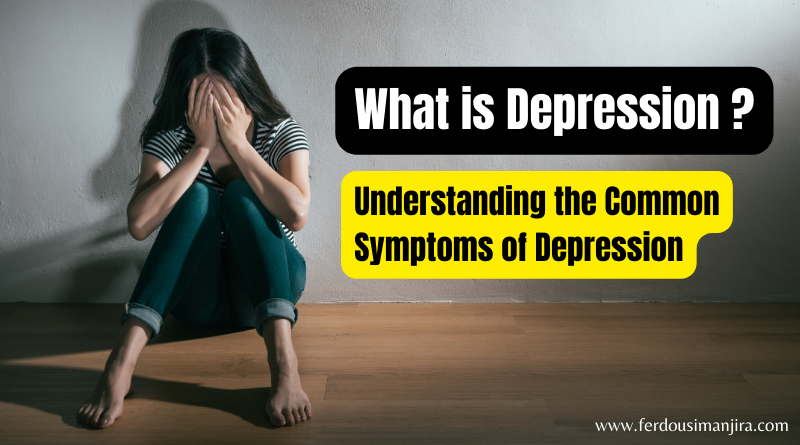What is Depression ?
Depression is a common and complex mental health condition that affects millions of people worldwide. It is a prevalent and severe medical condition characterized by a persistent negative impact on emotions, thoughts, and behaviors. Fortunately, it is treatable. Symptoms include feelings of sadness, a diminished interest in once-enjoyable activities, and can lead to both emotional and physical challenges, impacting daily functioning at work and home. This article aims to provide a comprehensive guide to understanding depression and identifying its common indicators.
Persistent Sadness :
One of the hallmark signs of depression is persistent sadness or a low mood that lasts for an extended period. Individuals may feel overwhelmed by feelings of emptiness or hopelessness, impacting their daily functioning.
Changes in Appetite and Sleep Patterns :
Depression can manifest physically through changes in appetite and sleep. Some individuals may experience a significant loss of appetite and weight, while others may turn to overeating. Similarly, disruptions in sleep patterns, such as insomnia or excessive sleeping, are common indicators.
Loss of Interest in Activities :
A noticeable shift in interest and participation in once-enjoyable activities is a key sign of depression. Hobbies and social engagements that used to bring joy may become burdensome or uninteresting, contributing to a sense of isolation.
Fatigue and Low Energy :
Individuals dealing with depression often experience persistent fatigue and low energy levels. Simple tasks may feel exhausting, and the motivation to engage in daily activities diminishes.
Feelings of Guilt or Worthlessness :
Depression can lead to negative thought patterns, causing individuals to feel an overwhelming sense of guilt, worthlessness, or self-blame. These feelings can contribute to a cycle of despair and hinder the ability to see positive aspects of life.
Difficulty Concentrating and Decision-Making :
Cognitive functions can be impaired in depression, making it challenging to concentrate on tasks or make decisions. This can impact work, academic performance, and overall daily functioning.
Physical Symptoms :
Depression is not limited to emotional and cognitive symptoms; it can also manifest physically. Individuals may experience unexplained aches and pains, headaches, or digestive issues without an apparent medical cause.
Thoughts of death or suicide:
Depression can alter cognitive processes, distorting one’s perception of reality and self-worth. The mind becomes a battleground between negative thoughts and a desperate search for relief. Suicidal thoughts can manifest as a perceived escape from the unrelenting pain, a misguided belief that death is the only way to end the suffering.
Social Withdrawal :
A tendency to withdraw from social interactions is common in depression. Individuals may isolate themselves from friends and family, contributing to a sense of loneliness and exacerbating the emotional impact of the condition.
Depression is a treatable mental disorder characterized by persistent feelings of sadness, hopelessness, and a lack of interest in activities. Between 80% and 90% of individuals with depression respond well to treatment. Diagnosis typically involves a comprehensive evaluation by a health professional, including interviews, physical examinations, and sometimes blood tests to rule out underlying medical causes. This process helps identify specific symptoms, consider medical and family histories, and address cultural and environmental factors, enabling the development of a tailored treatment plan.



